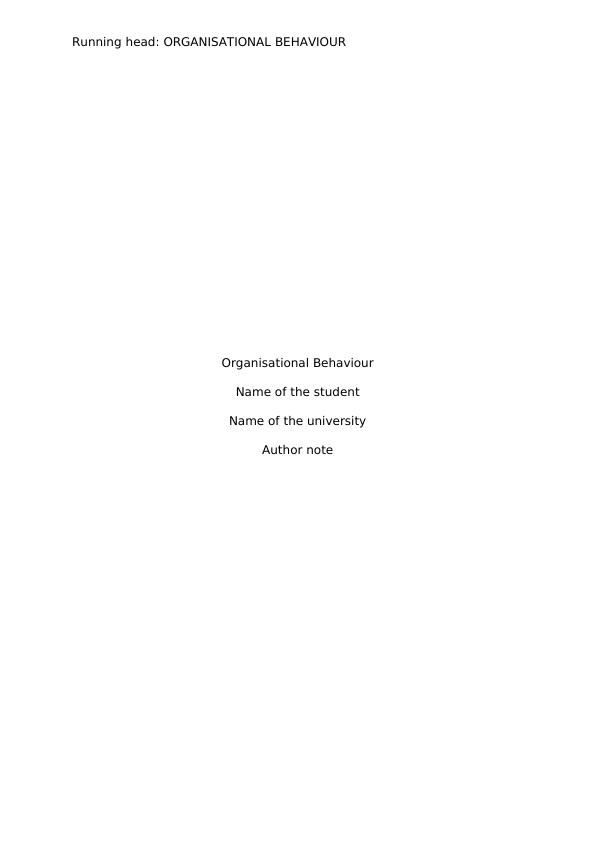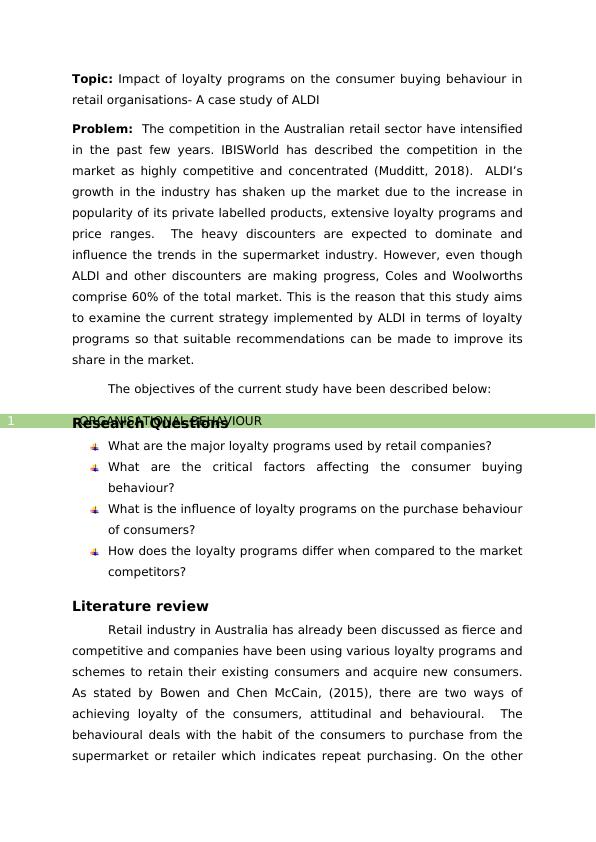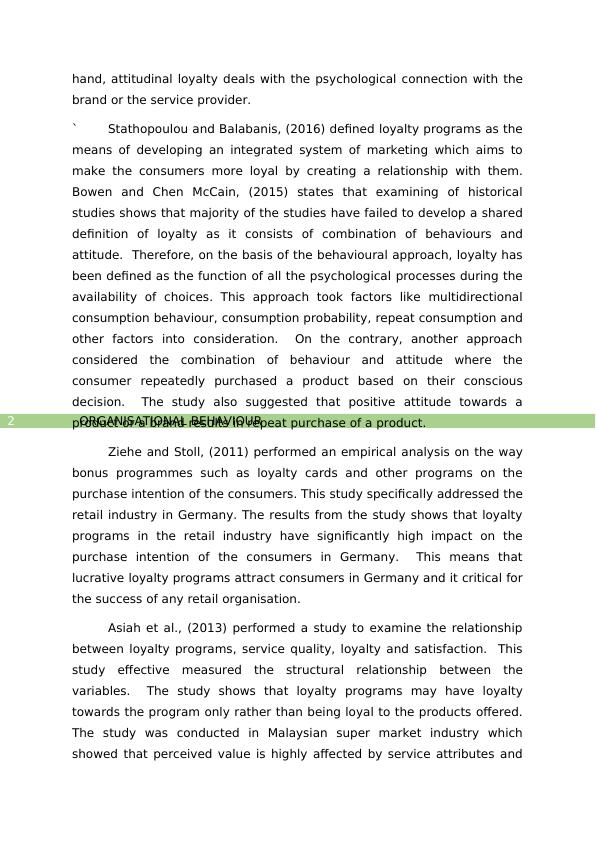Impact of Loyalty Programs on Consumer Buying Behaviour in Retail Organizations
Added on 2022-11-30
7 Pages1660 Words109 Views
Running head: ORGANISATIONAL BEHAVIOUR
Organisational Behaviour
Name of the student
Name of the university
Author note
Organisational Behaviour
Name of the student
Name of the university
Author note

ORGANISATIONAL BEHAVIOUR1
Topic: Impact of loyalty programs on the consumer buying behaviour in
retail organisations- A case study of ALDI
Problem: The competition in the Australian retail sector have intensified
in the past few years. IBISWorld has described the competition in the
market as highly competitive and concentrated (Mudditt, 2018). ALDI’s
growth in the industry has shaken up the market due to the increase in
popularity of its private labelled products, extensive loyalty programs and
price ranges. The heavy discounters are expected to dominate and
influence the trends in the supermarket industry. However, even though
ALDI and other discounters are making progress, Coles and Woolworths
comprise 60% of the total market. This is the reason that this study aims
to examine the current strategy implemented by ALDI in terms of loyalty
programs so that suitable recommendations can be made to improve its
share in the market.
The objectives of the current study have been described below:
Research Questions
What are the major loyalty programs used by retail companies?
What are the critical factors affecting the consumer buying
behaviour?
What is the influence of loyalty programs on the purchase behaviour
of consumers?
How does the loyalty programs differ when compared to the market
competitors?
Literature review
Retail industry in Australia has already been discussed as fierce and
competitive and companies have been using various loyalty programs and
schemes to retain their existing consumers and acquire new consumers.
As stated by Bowen and Chen McCain, (2015), there are two ways of
achieving loyalty of the consumers, attitudinal and behavioural. The
behavioural deals with the habit of the consumers to purchase from the
supermarket or retailer which indicates repeat purchasing. On the other
Topic: Impact of loyalty programs on the consumer buying behaviour in
retail organisations- A case study of ALDI
Problem: The competition in the Australian retail sector have intensified
in the past few years. IBISWorld has described the competition in the
market as highly competitive and concentrated (Mudditt, 2018). ALDI’s
growth in the industry has shaken up the market due to the increase in
popularity of its private labelled products, extensive loyalty programs and
price ranges. The heavy discounters are expected to dominate and
influence the trends in the supermarket industry. However, even though
ALDI and other discounters are making progress, Coles and Woolworths
comprise 60% of the total market. This is the reason that this study aims
to examine the current strategy implemented by ALDI in terms of loyalty
programs so that suitable recommendations can be made to improve its
share in the market.
The objectives of the current study have been described below:
Research Questions
What are the major loyalty programs used by retail companies?
What are the critical factors affecting the consumer buying
behaviour?
What is the influence of loyalty programs on the purchase behaviour
of consumers?
How does the loyalty programs differ when compared to the market
competitors?
Literature review
Retail industry in Australia has already been discussed as fierce and
competitive and companies have been using various loyalty programs and
schemes to retain their existing consumers and acquire new consumers.
As stated by Bowen and Chen McCain, (2015), there are two ways of
achieving loyalty of the consumers, attitudinal and behavioural. The
behavioural deals with the habit of the consumers to purchase from the
supermarket or retailer which indicates repeat purchasing. On the other

ORGANISATIONAL BEHAVIOUR2
hand, attitudinal loyalty deals with the psychological connection with the
brand or the service provider.
` Stathopoulou and Balabanis, (2016) defined loyalty programs as the
means of developing an integrated system of marketing which aims to
make the consumers more loyal by creating a relationship with them.
Bowen and Chen McCain, (2015) states that examining of historical
studies shows that majority of the studies have failed to develop a shared
definition of loyalty as it consists of combination of behaviours and
attitude. Therefore, on the basis of the behavioural approach, loyalty has
been defined as the function of all the psychological processes during the
availability of choices. This approach took factors like multidirectional
consumption behaviour, consumption probability, repeat consumption and
other factors into consideration. On the contrary, another approach
considered the combination of behaviour and attitude where the
consumer repeatedly purchased a product based on their conscious
decision. The study also suggested that positive attitude towards a
product or a brand results in repeat purchase of a product.
Ziehe and Stoll, (2011) performed an empirical analysis on the way
bonus programmes such as loyalty cards and other programs on the
purchase intention of the consumers. This study specifically addressed the
retail industry in Germany. The results from the study shows that loyalty
programs in the retail industry have significantly high impact on the
purchase intention of the consumers in Germany. This means that
lucrative loyalty programs attract consumers in Germany and it critical for
the success of any retail organisation.
Asiah et al., (2013) performed a study to examine the relationship
between loyalty programs, service quality, loyalty and satisfaction. This
study effective measured the structural relationship between the
variables. The study shows that loyalty programs may have loyalty
towards the program only rather than being loyal to the products offered.
The study was conducted in Malaysian super market industry which
showed that perceived value is highly affected by service attributes and
hand, attitudinal loyalty deals with the psychological connection with the
brand or the service provider.
` Stathopoulou and Balabanis, (2016) defined loyalty programs as the
means of developing an integrated system of marketing which aims to
make the consumers more loyal by creating a relationship with them.
Bowen and Chen McCain, (2015) states that examining of historical
studies shows that majority of the studies have failed to develop a shared
definition of loyalty as it consists of combination of behaviours and
attitude. Therefore, on the basis of the behavioural approach, loyalty has
been defined as the function of all the psychological processes during the
availability of choices. This approach took factors like multidirectional
consumption behaviour, consumption probability, repeat consumption and
other factors into consideration. On the contrary, another approach
considered the combination of behaviour and attitude where the
consumer repeatedly purchased a product based on their conscious
decision. The study also suggested that positive attitude towards a
product or a brand results in repeat purchase of a product.
Ziehe and Stoll, (2011) performed an empirical analysis on the way
bonus programmes such as loyalty cards and other programs on the
purchase intention of the consumers. This study specifically addressed the
retail industry in Germany. The results from the study shows that loyalty
programs in the retail industry have significantly high impact on the
purchase intention of the consumers in Germany. This means that
lucrative loyalty programs attract consumers in Germany and it critical for
the success of any retail organisation.
Asiah et al., (2013) performed a study to examine the relationship
between loyalty programs, service quality, loyalty and satisfaction. This
study effective measured the structural relationship between the
variables. The study shows that loyalty programs may have loyalty
towards the program only rather than being loyal to the products offered.
The study was conducted in Malaysian super market industry which
showed that perceived value is highly affected by service attributes and

End of preview
Want to access all the pages? Upload your documents or become a member.
Related Documents
Customer Satisfaction and Loyalty: A Critical Reviewlg...
|6
|1401
|201
Research Project on Consumer Behaviour (Doc)lg...
|11
|3019
|40
Consumer Behavior Assignment: Tescolg...
|13
|3458
|33
MARKETING STRATEGIES AND CONSUMER BEHAVIOUR.lg...
|10
|3118
|1
Effect of Loyalty Programs on Consumer Behavior: A Literature Reviewlg...
|4
|871
|485
Analysis of Tesco's Cost Leadership Strategy and Market Positionlg...
|10
|3240
|81
